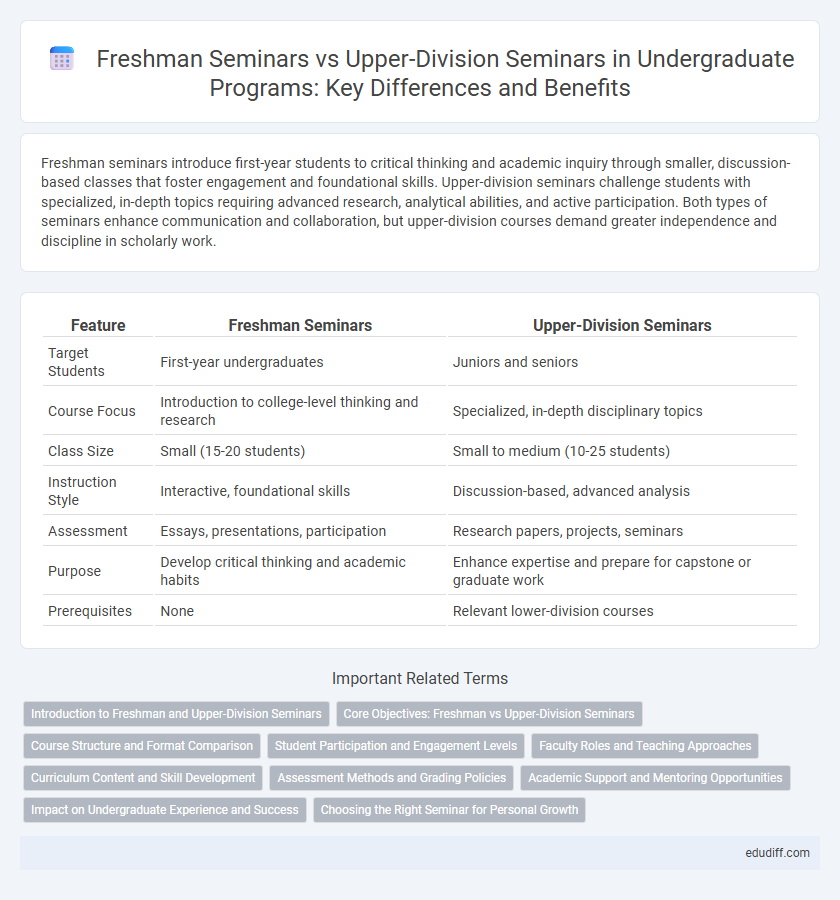Freshman seminars introduce first-year students to critical thinking and academic inquiry through smaller, discussion-based classes that foster engagement and foundational skills. Upper-division seminars challenge students with specialized, in-depth topics requiring advanced research, analytical abilities, and active participation. Both types of seminars enhance communication and collaboration, but upper-division courses demand greater independence and discipline in scholarly work.
Table of Comparison
| Feature | Freshman Seminars | Upper-Division Seminars |
|---|---|---|
| Target Students | First-year undergraduates | Juniors and seniors |
| Course Focus | Introduction to college-level thinking and research | Specialized, in-depth disciplinary topics |
| Class Size | Small (15-20 students) | Small to medium (10-25 students) |
| Instruction Style | Interactive, foundational skills | Discussion-based, advanced analysis |
| Assessment | Essays, presentations, participation | Research papers, projects, seminars |
| Purpose | Develop critical thinking and academic habits | Enhance expertise and prepare for capstone or graduate work |
| Prerequisites | None | Relevant lower-division courses |
Introduction to Freshman and Upper-Division Seminars
Freshman seminars introduce students to critical thinking, academic research, and writing skills through small, discussion-based classes designed to ease the transition into college. Upper-division seminars focus on specialized topics within a major, promoting in-depth analysis, advanced research methodologies, and scholarly debate. These upper-level courses prepare undergraduates for capstone projects or graduate studies by fostering expertise and professional-level discourse.
Core Objectives: Freshman vs Upper-Division Seminars
Freshman seminars concentrate on developing foundational skills such as critical thinking, effective communication, and introductory research methods, aligning with core objectives that prepare students for academic success across disciplines. Upper-division seminars emphasize advanced analytical skills, specialized knowledge, and professional-level discourse, catering to students' deepening expertise within their major fields. The distinction in core objectives reflects a progression from broad academic abilities to focused, discipline-specific competencies essential for upper-level undergraduate study.
Course Structure and Format Comparison
Freshman seminars typically feature smaller class sizes, interactive discussions, and foundational topics designed to develop critical thinking and academic skills, often with a focus on broad, interdisciplinary themes. Upper-division seminars are more specialized, with in-depth exploration of specific subject matter, emphasizing original research, critical analysis, and advanced problem-solving within the student's major. The format of upper-division seminars usually involves extensive student presentations, peer review, and close faculty mentorship, contrasting with the more guided and participatory approach of freshman seminars.
Student Participation and Engagement Levels
Freshman seminars typically feature smaller class sizes and interactive formats that encourage high student participation and engagement through introductory discussions and collaborative activities. Upper-division seminars often involve advanced, specialized topics where student engagement is driven by in-depth analysis, debates, and independent research projects. Participation in upper-division seminars tends to be more self-directed, reflecting students' deeper subject knowledge and increased academic maturity.
Faculty Roles and Teaching Approaches
Faculty roles in freshman seminars often emphasize mentorship and foundational skill-building, fostering student engagement through interactive teaching approaches like discussions and collaborative projects. In contrast, upper-division seminars require faculty to adopt a more specialized and research-oriented role, guiding students through critical analysis, advanced topics, and independent inquiry with a focus on discipline-specific methodologies. Teaching approaches in upper-division seminars prioritize deep content mastery and scholarly debate, facilitating students' transition to professional academic standards.
Curriculum Content and Skill Development
Freshman seminars immerse students in broad disciplinary themes and critical thinking exercises that build foundational academic skills, including reading comprehension and written communication. Upper-division seminars emphasize specialized, in-depth content with a focus on advanced research methodologies, analytical reasoning, and discipline-specific problem-solving abilities. Curriculum content in upper-division courses is typically more rigorous, requiring synthesis of prior knowledge and fostering professional-level discourse.
Assessment Methods and Grading Policies
Freshman seminars typically use formative assessments like quizzes, reflections, and participation to build foundational skills, with grading policies emphasizing engagement and comprehension. Upper-division seminars rely more on summative assessments such as research papers, presentations, and comprehensive exams, often incorporating peer reviews and critical analysis into grading criteria. These differences reflect the progressive complexity and depth expected as students advance through their undergraduate studies.
Academic Support and Mentoring Opportunities
Freshman seminars provide foundational academic support through structured guidance and personalized mentoring, helping new students transition into college-level work. Upper-division seminars offer advanced mentoring tailored to specialized fields, fostering deeper academic engagement and professional development. Both seminar types enhance student success by connecting learners with faculty expertise and peer collaboration.
Impact on Undergraduate Experience and Success
Freshman seminars provide foundational skills and early academic engagement, fostering critical thinking and time management that set the stage for academic success. Upper-division seminars offer specialized, in-depth exploration of discipline-specific topics, enhancing research skills and professional development crucial for career readiness. Both seminar types significantly impact undergraduate experience by promoting intellectual growth, increasing retention rates, and improving GPA performance.
Choosing the Right Seminar for Personal Growth
Freshman seminars provide foundational skills and opportunities for exploration, fostering critical thinking and engagement in a smaller, supportive environment. Upper-division seminars offer specialized, discipline-specific knowledge and advanced discussions that prepare students for professional and research careers. Selecting the right seminar depends on individual academic goals and desired depth of study to maximize personal and intellectual growth.
Freshman seminars vs Upper-division seminars Infographic

 edudiff.com
edudiff.com